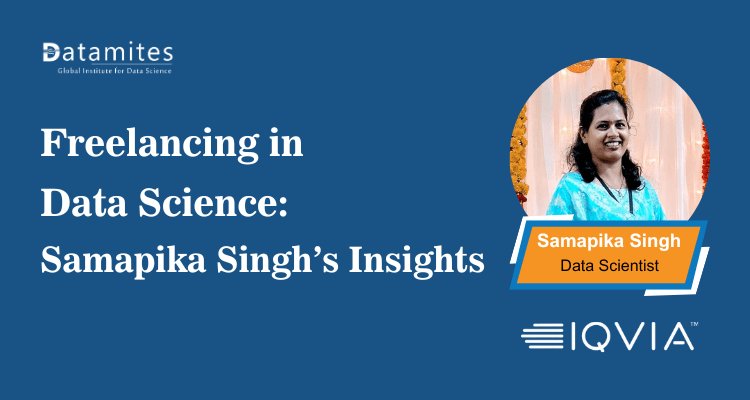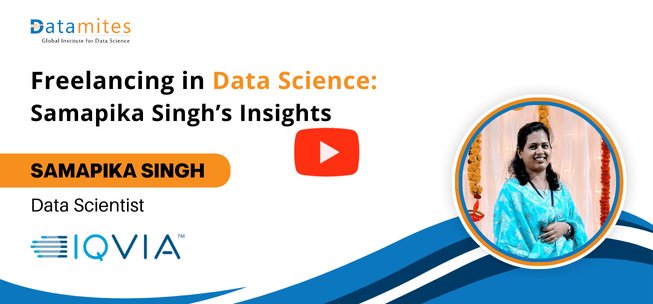Freelancing in Data Science: Samapika Singh’s Insights
Samapika Singh explores the realities of freelancing in data science, from building a client base to managing projects independently. She highlights practical strategies and challenges for thriving outside a traditional job.

The world of data science can feel intimidating from the outside complex algorithms, endless coding, and a tech landscape that changes overnight. But when you hear from someone who’s actually walked the path, it suddenly feels achievable. That’s what happened in our Alumni Talk with Samapika Singh, a seasoned IT professional with over 14 years of experience who transitioned into Data Science and is now growing as a freelance Data Scientist. An alumna of DataMites, she has worked with IQVIA and is currently managing multiple AI and data projects as a freelancer.
Her story is a reminder that with the right training and persistence, breaking into this field is possible. She shared her journey, lessons learned, and practical advice for anyone looking to start or grow in Data Science. If you’re curious about real career transformations, you should watch DataMites success story sessions like this one they offer not just inspiration but also actionable insights to help you carve your own path.
How Samapika Successfully Built Her Data Science Career with DataMites
Here’s how Samapika transitioned into data science through structured learning, real-world projects, and the right guidance.
Q1. Can you tell us about your career journey before moving into data science?
I spent more than 14 years in the IT industry, starting in data warehousing and related technologies. That background gave me a solid foundation to understand data deeply, which later helped me transition into AI and data science.
Q2. What motivated you to switch to data science?
Data science felt like the natural next step because everything in IT is now data-driven. I wanted to grow in a field that had long-term potential, and AI/data science offered that.
Q3. How did Datamites help you in your journey?
Datamites was a turning point. Their training helped me bridge the gap between my existing data knowledge and modern data science skills. The hands-on labs, guidance from faculty, and structured learning gave me the confidence to step into projects right after training.
Q4. You mentioned freelancing how did you start working as a freelance data scientist?
After my training and work at IQVIA, I started exploring freelance opportunities in AI projects. Since the demand for data science and AI is very high, I was able to land projects fairly quickly.
Q5. What kind of freelance projects are you working on right now?
I’m working on healthcare-focused AI solutions, Snowflake Cortex projects, and product development in startups. Freelancing allows me to diversify across multiple projects instead of being limited to one company.
Q6. How do you balance working as a Data Engineer, Data Scientist, and Freelancer?
By focusing on my strengths data understanding, Python, and problem-solving. Once you build strong fundamentals, you can move across roles without too much difficulty.
Q7. Should aspirants choose Data Engineering or Data Science?
It depends on your interest, but here’s my advice:
- If you enjoy coding, problem-solving, and analysis, go for Data Science.
- If you’re inclined towards managing and structuring large volumes of data, Data Engineering might suit you better.
Either way, Python and SQL are must-haves.
Q8. What technologies and tools do you use regularly?
Python (and its libraries like Pandas, NumPy), PySpark, Snowflake, SQL, and AI-related frameworks. If you know Python well, you can adapt to most libraries and frameworks easily.
Q9. How important is coding in data science?
Many aspirants fear coding, but it’s not as hard as it looks. You don’t need to be a software engineer. If you’re logically strong and practice consistently, Python becomes easy. Tools and AI assistants also help speed up work, but the basics are essential.
Q10. How much competition is there in the data science job market?
The competition is strong, but so is the demand. What sets you apart is your ability to understand data, apply concepts to real problems, and keep learning. Practical exposure is more valuable than just theoretical knowledge.
Q11. What are interviews like for data science roles?
Expect 3–4 rounds, including technical, coding, and a client round. Companies test your knowledge of machine learning, Python, SQL, and logical problem-solving. The client round is crucial they want to know you can deliver.
Q12. How do you manage time while handling both professional and personal responsibilities?
It’s challenging, especially with a young child, but if you love what you’re learning, it doesn’t feel like a burden. AI tools have also boosted productivity I finish tasks faster and spend more time with family.
Q13. What advice do you have for beginners starting in data science?
Get guided training to speed up your learning. Don’t try to learn everything alone it takes much longer. Structured courses plus self-practice work best.
Q14. How long does it take to get comfortable with programming if you have no background?
With consistent practice, you can learn Python in about a month. I had no prior programming background and managed to pick it up quickly during my training.
Q15. What’s the one skill that helped you most in your career transition?
Understanding data. No matter how advanced AI or data science becomes, if you don’t understand data at its core, you won’t be able to create meaningful insights.
Refer these articles:
- Nirmal Vani’s Journey to Success in Data Science
- Saurav’s Journey: From Fresher to Data Scientist
- Tejaswini’s Path to Data Science Success
Key Takeaways from Samapika’s Data Science Journey
Here are the most valuable lessons and insights from her experience that can guide anyone looking to begin or advance a career in data science.
- Background matters: A strong foundation in data (like data warehousing) makes transitioning into data science smoother.
- Training accelerates growth: Structured programs, like the one at Datamites, help bridge gaps faster than self-learning alone.
- Freelancing is viable: There’s high demand for freelance data scientists, especially in healthcare AI and data engineering projects.
- Core skills are non-negotiable: Python, SQL, and logical problem-solving are essential for both Data Science and Data Engineering.
- Choose based on interest: Data Science focuses on analysis and modeling, while Data Engineering emphasizes managing and structuring large datasets.
- Coding fear is overrated: You don’t need to be a hardcore programmer consistent practice makes Python manageable in a short time.
- Big Data tools are in demand: Technologies like PySpark and Snowflake are widely used in real-world projects.
- Competition is high but opportunities are higher: Demand for skilled data professionals outpaces the number of qualified candidates.
- Interviews test fundamentals: Expect rounds covering machine learning, SQL, coding, and client communication.
- Data understanding is the edge: Knowing how to analyze and interpret data effectively is more valuable than memorizing tools.
- AI tools improve productivity: Leveraging AI assistants can save time, allowing better work-life balance.
- Time management is crucial: Balancing personal and professional life is possible with discipline and the right tools.
- Guidance matters: Having mentors or structured courses helps avoid wasted effort and accelerates learning.
- Practical exposure > theory: Real-world application of concepts carries more weight than just certification.
- Mindset is everything: Curiosity, adaptability, and continuous learning are the real drivers of long-term success in data science.
Refer these articles:
- How to Become a Data Scientist in Chennai
- Data Science Course Fee in Chennai
- How to become a Data Scientist in Coimbatore
- Data Science Course Fees in Coimbatore
Samapika’s journey shows that with solid training, persistence, and the right approach, it’s possible to move from IT into a successful career in data science. Her experience with DataMites proves how hands-on practice, real projects, and guided learning can turn knowledge into opportunities. With data science ranking among the IT courses in demand today, her advice stands out: keep learning, stay consistent, and focus on applying your skills in real-world scenarios.
If Samapika’s journey inspires you to pursue a career in data science, there’s no better time to start building your skills. According to Precedence Research, the global data science platform market is expected to grow from USD 175.15 billion in 2025 to more than USD 676.51 billion by 2034, at a CAGR of 16.20%. With businesses generating massive amounts of data every day, the demand for skilled professionals is only rising. Choosing the right training institute that emphasizes practical learning, real-world projects, and placement support can give you the edge. Enrolling in a data science training in Coimbatore, Bangalore, Mumbai, Hyderabad, Chennai, Pune, or Delhi can unlock countless opportunities across industries.
For Samapika, structured training and mentorship at DataMites Institute were the game changers in her transition. By mastering Data Science, Machine Learning, Python, SQL, and Deep Learning, and applying those skills to industry-relevant projects, she gained the confidence to land her role at IQVIA and later grow as a freelance Data Scientist.
Today, DataMites offers the same career-launching opportunities through data science courses in Chennai, Mumbai, Bangalore, Hyderabad, Pune, Coimbatore, and Ahmedabad, along with flexible online programs. Whether you’re a fresher, a working professional, or planning a career shift, DataMites can help you build a strong foundation just like it did for Samapika.

